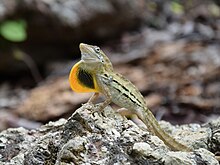| Striped anole | |
|---|---|

| |

| |
| Male displaying dewlap above, individual on tree below | |
|
Scientific classification
| |
| Domain: | Eukaryota |
| Kingdom: | Animalia |
| Phylum: | Chordata |
| Class: | Reptilia |
| Order: | Squamata |
| Suborder: | Iguania |
| Family: | Dactyloidae |
| Genus: | Anolis |
| Species: | A. lineatus
|
| Binomial name | |
| Anolis lineatus
Daudin, 1802
| |
| Synonyms | |
| |
Anolis lineatus, the Curaçao striped anole or striped anole, is a species of lizard in the family Dactyloidae. It is native to Curaçao and Aruba of the Netherlands Antilles, but has also been introduced to Klein Curaçao. [1] It is generally common (at least on Curaçao), [2] and is particularly common in densely vegetated gardens in the capital Willemstad. [3] It is found in dry tropical shrubland at all elevations in its range, [1] but is uncommon in habitats without larger trees. [3] It can often be seen on rocks, the walls of buildings or tree trunks; at various heights but often relatively close to the ground. [4] It is a member of the A. chrysolepis species group. [4]
In A. lineatus, males reach about 7–7.5 cm (2.8–3.0 in) in snout-to- vent length and the females about 6 cm (2.4 in). [3] It is overall light brownish with a dark-edged pale lateral stripe on each side, and typically several light bars on the body and tail. [3] It has an orange-yellow dewlap with a blackish spot; the dewlap is significantly larger in males than in females. [3] It is the only known species of anole where the dewlap is asymmetrically coloured, being deeper orange on one side and yellower on the other. [4] [5] In almost three-quarter of all individuals the left side is the most yellow. [5] The colour difference between the two sides is indistinct in only a minority of the females. [4] [5]
References
- ^ a b c van Buurt, G.; van den Burg, M.P.; Mayer, G.C. (2020). "Anolis lineatus". IUCN Red List of Threatened Species. 2020: e.T178607A18966631. doi: 10.2305/IUCN.UK.2020-3.RLTS.T178607A18966631.en. Retrieved 13 November 2021.
- ^ De Rooij, N. (1922). "Reptiles and Amphibians of Curaçao" (pdf). Bijdragen tot de Dierkunde. 22 (1): 249–253. doi: 10.1163/26660644-02201034.
- ^ a b c d e Rand, S.; Rand, P.J. (1967). "Field notes on Anolis lineatus in Curaçao" (pdf). Studies on the Fauna of Curaçao and other Caribbean Islands. 24 (1): 112–117.
- ^ a b c d Gartner; Gamble; Jaffe; Harrison; Losos (2013). "Left–right dewlap asymmetry and phylogeography of Anolis lineatus on Aruba and Curaçao". Biological Journal of the Linnean Society. 110 (2): 409–426. doi: 10.1111/bij.12131.
- ^ a b c Losos; Weaver; Fies; Herrel; Fabre; Losos (2017). "The Curious Case of the Left-Sided Dewlap: Directional Asymmetry in the Curaçao Anole, Anolis linestus". Breviora. 553 (1): 1–7. doi: 10.3099/MCZ35.1. S2CID 4712671.
| Striped anole | |
|---|---|

| |

| |
| Male displaying dewlap above, individual on tree below | |
|
Scientific classification
| |
| Domain: | Eukaryota |
| Kingdom: | Animalia |
| Phylum: | Chordata |
| Class: | Reptilia |
| Order: | Squamata |
| Suborder: | Iguania |
| Family: | Dactyloidae |
| Genus: | Anolis |
| Species: | A. lineatus
|
| Binomial name | |
| Anolis lineatus
Daudin, 1802
| |
| Synonyms | |
| |
Anolis lineatus, the Curaçao striped anole or striped anole, is a species of lizard in the family Dactyloidae. It is native to Curaçao and Aruba of the Netherlands Antilles, but has also been introduced to Klein Curaçao. [1] It is generally common (at least on Curaçao), [2] and is particularly common in densely vegetated gardens in the capital Willemstad. [3] It is found in dry tropical shrubland at all elevations in its range, [1] but is uncommon in habitats without larger trees. [3] It can often be seen on rocks, the walls of buildings or tree trunks; at various heights but often relatively close to the ground. [4] It is a member of the A. chrysolepis species group. [4]
In A. lineatus, males reach about 7–7.5 cm (2.8–3.0 in) in snout-to- vent length and the females about 6 cm (2.4 in). [3] It is overall light brownish with a dark-edged pale lateral stripe on each side, and typically several light bars on the body and tail. [3] It has an orange-yellow dewlap with a blackish spot; the dewlap is significantly larger in males than in females. [3] It is the only known species of anole where the dewlap is asymmetrically coloured, being deeper orange on one side and yellower on the other. [4] [5] In almost three-quarter of all individuals the left side is the most yellow. [5] The colour difference between the two sides is indistinct in only a minority of the females. [4] [5]
References
- ^ a b c van Buurt, G.; van den Burg, M.P.; Mayer, G.C. (2020). "Anolis lineatus". IUCN Red List of Threatened Species. 2020: e.T178607A18966631. doi: 10.2305/IUCN.UK.2020-3.RLTS.T178607A18966631.en. Retrieved 13 November 2021.
- ^ De Rooij, N. (1922). "Reptiles and Amphibians of Curaçao" (pdf). Bijdragen tot de Dierkunde. 22 (1): 249–253. doi: 10.1163/26660644-02201034.
- ^ a b c d e Rand, S.; Rand, P.J. (1967). "Field notes on Anolis lineatus in Curaçao" (pdf). Studies on the Fauna of Curaçao and other Caribbean Islands. 24 (1): 112–117.
- ^ a b c d Gartner; Gamble; Jaffe; Harrison; Losos (2013). "Left–right dewlap asymmetry and phylogeography of Anolis lineatus on Aruba and Curaçao". Biological Journal of the Linnean Society. 110 (2): 409–426. doi: 10.1111/bij.12131.
- ^ a b c Losos; Weaver; Fies; Herrel; Fabre; Losos (2017). "The Curious Case of the Left-Sided Dewlap: Directional Asymmetry in the Curaçao Anole, Anolis linestus". Breviora. 553 (1): 1–7. doi: 10.3099/MCZ35.1. S2CID 4712671.
